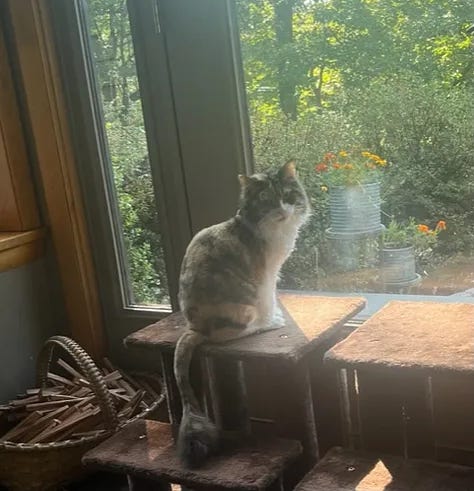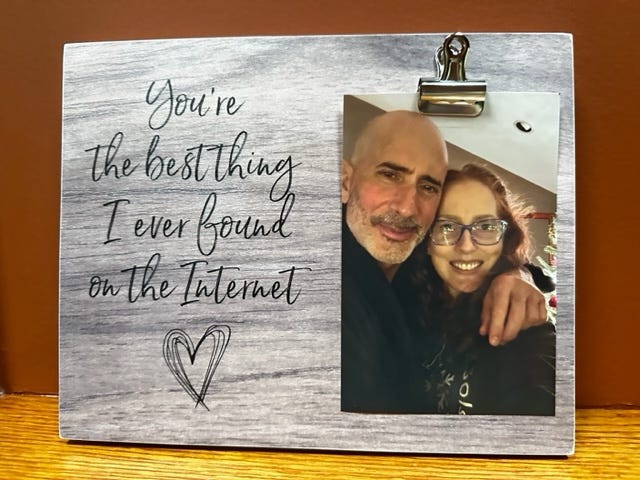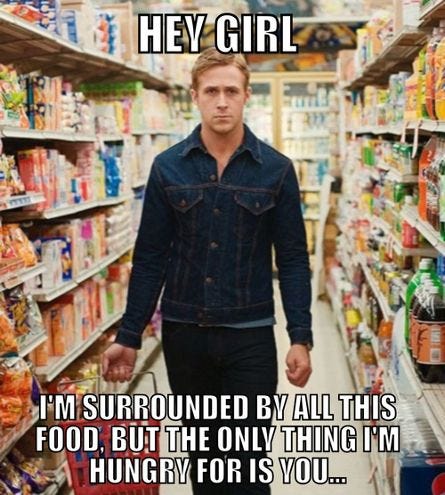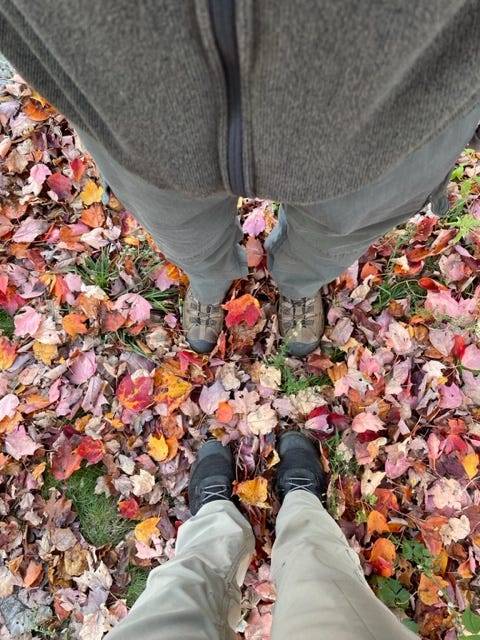On Wednesday, Baldy and I celebrated our 20th wedding anniversary. For this momentous occasion, he drank colonoscopy prep throughout the day – a mouthwatering lemon-lime Gatorade lax-shake - and I fasted all day in solidarity (and to induce autophagy; long haulers may want to check out the After-party below for a potentially helpful protocol).
It was decidedly unromantic. We barely saw each other for most of the day, each of us suffering in our own corners of the house. We came together in the evening when we normally do, he over a cup of veggie broth and I over a cup of mint tea.
We had decided not to do any extravagant gift-giving or dinner out because money is tight these days, but he surprised me by refurbishing our caricature wedding cake topper, gifted to us way back then by our talented artist friend Dylan.
Sigh…I wish my hair was still that red.
I cheated on the no gift thing and got him this from Etsy (because the only arts and crafts I do is adding memes and GIFs to Substack posts):
Technically, he found me on the internet, but I found this gift on the internet (so meta), so the three best things found on the internet are now in one place 🤯, and I win.
Back to our big day. We opened our cards to read about what the last 20 years have meant to each of us. It was just about the perfect evening, except soon after this, we both declared that our hunger (for food, not for each other) had caught up to us.
Okay, let’s get serious: sickness and grief (please keep reading, it’s not a huge bummer)
I decided when writing my card for him that I would not mention my illness or recovery. It has been written of enough in many a birthday, Solstice, anniversary, or Valentine’s Day card in the last 3.5 years. I did talk about how I wouldn’t change any of our struggles of the past two decades since, along with the good times, they contributed to us making it this far.
At some point at least a year into this illness, I made the conscious decision not to constantly talk to Baldy about every little thing I was going through. Having been in relationship with people who became consumed by their problems and consciously or subconsciously dumped it all on me, I knew I didn’t want my new identity to wholly be “sick wife.” I wanted to try as much as possible to stay a well-rounded companion, someone still interested in the larger world and in his wants, needs, aches and pains.
Patricia A. Fennell, in her excellent book The Chronic Illness Workbook: Strategies and Solutions for Taking Back Your Life, agrees with this approach:
“If you don’t attend to your suffering consciously, you’ll suffer neurotically and make yourself and others miserable. Making others miserable pushes them away. This will make you even more miserable and deprive you of the support and good will that’s absolutely essential to you. You become more and more isolated and miserable.”
I’ve invested in therapy, which has been enormously helpful in giving me a space outside of my marriage to process my sadness and to work on acceptance. And don’t get me wrong: I did, and I do still, let Baldy know when I’m having a rough day, and I also vent to him here and there about my journey with doctors and with disability benefits. Like any partner would, I want to be understood and to not feel so alone in these struggles. But I try to have just the amount of discussion necessary to either solicit the empathy or the concrete support I seek in that moment, before moving on to other topics or just to quietude.
I tried much harder to preserve this aspect of myself and of us as a couple than I did trying not to become the “sick sister” or “sick friend,” in part because I wasn’t seeing or talking to my siblings or friends nearly as much as I was interacting with my husband. And the reality was, in many ways I had become my illness. This is somewhat unavoidable when your illness is as utterly life-altering as Long COVID is; when you can’t do most of what you used to do, either at all or anywhere near the degree to which you used to do, you naturally start to turn into someone else.
I remember at one point within the first year saying to my sister, “I’m grieving the loss of fun Aunt Amy.” Some of our best times, which often include my sibkids (her now adult kids) have been punctuated by cocktails, boisterous game-playing, obnoxious singing, and general cantankerousness.
She responded, “I’m grieving the loss of fun Aunt Amy too.”
I kid! Others might have been saddened or maybe even offended by that admission – after all, aren’t I still the same person on the inside, even if I’ve had to scale back my high-energy hijinks? Instead, I appreciated what my sister said because it was honest, a kind of validation that my situation was serious enough to necessitate a major shift in our joie de vivre. It also acknowledged the right she had to her own sadness about the situation, and in some small measure that helped me gain perspective on the emotional weight of this illness on the people around me.
Not entirely tangential tangent: earlier this year, I was texting with sibkid Valley, my sister’s youngest, lamenting that it felt at times that no one has any use for me now that I’m not fun Aunt Amy anymore. Their response was characteristically poignant: they said that I’m a new kind of fun that frankly they prefer because fun Aunt Amy was overstimulating to them at times. I was floored. I had never considered that the old me had been too much at times. What they shared was so deep to me, I wrote it in my therapy journal so I could keep chewing on it over time. Was this one of the unintended benefits of this illness, that it calmed me down in ways that appealed to at least one of my most cherished family members?
My grief…
With a life-upending illness, much of the focus is given to the patient acknowledging and accepting their illness and limitations, and processing the emotions involved in no longer being able to work or to parent like you used to, or to move through the physical joys of life, let alone activities of daily living like showering and cooking. With conditions in which one’s health gradually deteriorates, there is at least time to accept and grieve, even if it’s still difficult.
I lost my father when I was 17 and my mother when I was 24. My father died suddenly; my mother over a few years. Grieving the loss of my father, while complicated by my young age, was so hard to process because there was no time to plan, no time to process, no time to say all the things, including goodbye.
Getting a somewhat novel chronic illness essentially overnight that took me from being a healthy, physically active woman with a rewarding career and a full, satisfying life to someone who was forced, by a show-stopping fatigue and a host of other very nasty and disturbing symptoms, to crawl through every second of each day was a huge shock. There was no time for me or anyone else in my life to see it coming.
…and theirs
The conversations I’d had with my sister and my sibkid, and several often-tearful ones I had had with Baldy, had me thinking a lot about chronic illness caregiver grief.
Fennell says,
“While other people may recognize and even sympathize with the suffering of the person you’re caring for, not many will think about your traumas or suffering….”
and thus
“you may not receive the sympathy, attention, and support that you need.”
Baldy is the only one who really had a front-row seat to my take-down. He was as confused and as powerless as I was in the beginning. As I started doing what I tended to do in problematic situations – take control, searching frantically for information and resources online and in the real world all while holding down a big day job – he began shifting into caregiver mode. For better or worse, he had taken a planned retirement from his federal job on March 31, 2020 – a week after I got the COVID neither of us had any reason to believe I wouldn’t recover from. His being home as my chronic illness worsened allowed the rhythms of our house and life management to shift; he took on the lion’s share of the inside housework, in addition to what he was already doing outside every day, so that I could try to keep working.
But I couldn’t sustain working. There were ups and downs over a two-year period, but ultimately, even trying to do my job on a part-time basis was making my health decline even further. Baldy was already working part-time, but he had to take on more shifts so we could survive financially through the (unpaid) process of me applying for disability. Once I finally won (see that story here), we found he had to keep those shifts and take on even more for us to keep up with our bills, all while still handling most everything around the house.
It certainly hasn’t been the retirement we envisioned for him, and there is a certain grief in that. He has acknowledged this but hasn’t complained much about it; he truly bought into “for better or worse” and understands this is just how life goes sometimes. I think he would agree that the harder part has been watching me suffer and being powerless to relieve that suffering. And we have had more conversations about what else he was sad about having lost to my illness.
Fennell talks about the importance of caregiver grieving:
“without proper grieving, resentment and anger can fester. Usually then you feel guilty and ashamed, which eventually makes you even more resentful and angry. Opportunities for misunderstanding and inappropriate behavior multiply.” Grieving, she says, can help you “move forward constructively.”
When I wasn’t recovering like we’d expected and more time had passed, I was glad when Baldy acknowledged that he really missed hiking. We don’t have tons of overlapping interests, but hiking always made us feel connected to each other and to the larger world. We loved it so much that virtually every vacation we took was centered around where we could hike together next. We’d clocked hundreds of miles in the U.S. with more plans in the works. Then came Long COVID, and hiking was abruptly and unceremoniously taken off the table.
I have tried to nudge him to go the trails alone, to not sacrifice his own happiness, especially since so much of his time is spent keeping our lives going. He resisted at first, and I understand why. Hiking was our thing together. Neither of us did much of it before the other came along. In the beauty and peacefulness of nature, we cleared our minds from the day to day, which perhaps ironically had us then discuss bigger decisions in our lives – often financial or family matters, future trips, selling our home and buying a new one. These decisions never became disagreements or arguments on the trail, and I credit the soothing balm of nature for that. The trails are giving you peace; it feels sacrilegious to give them any sort of conflict or tension in return.
This spring, I was able to convince him to go with me to a local nature preserve and to do a short solo hike while I ambled slowly alongside a lake that has benches where I could rest as needed. This way we both would get our ‘hit’ of nature and we were quasi-together. As I am typically our trail navigator, I led him to the trailhead before turning back toward the lake, where I had my moment of magic when I found these two turtles sunbathing on a log.
In the end, we both had a sense of satisfaction that we needn’t throw the baby out with the bathwater just because we can’t do things the way we used to (I then got even more of a dopamine hit when we stopped for ice cream after 🍨😋).
Bringing this in for a landing
When we get sick, we don’t stop loving or caring about those around us. It’s just that the way we show it may have to change. Likewise, our caregivers are supremely human, with emotions, needs, and frustrations of their own. (For a beautiful conversation on this, check out Substacker
’s recent talk All the Rules Are Made Up with fellow Substacker ).While those who are ill often do get consumed by their illness and recovery efforts (and we do need space to share this at times with our loved ones), we would do well to also normalize and make space for the grief or emotional responses of our friends and family. They deserve to be held, emotionally and/or physically, not just because they deserved it before we got sick, but as the greatest (and sometimes only) way we can thank them for showing up for us (be that cooking us dinner, taking us to the doctor, listening to our cries and frustrations with our limitations, or simply sending a text that momentarily transported us outside of our four walls).
To my big sister (especially 💛), my sibkids, my in-laws, two of my brothers, my friends, my former co-workers, my neighbors, and my fellow long haulers – most of whom I’ve still not met in person – I thank you for all the ways you’ve shown me care and love. I hope I have given you some measure of it in return these last three and a half years.
To my Baldy – I won’t get sappy here; please refer to the anniversary card on the kitchen table. The readers get the gist of how I feel about you. Here’s to at least 20 more years of togetherness, sentimental cards, and trail time 🧡.
🥳 The After-party 🥳
Announcements, links to articles and studies, recommendations and shout-outs, and miscellany joy and/or tomfoolery.
💑 Because it’s on topic, Caregiver Wisdom is a site where caregivers of those with ME/CFS, Long COVID, and similar illnesses can get support.
🍽️ As referenced earlier in the post, here is Tom Bunker’s Autophagy Protocol for any long haulers interested in the potential benefits of fasting, which many said have aided in their recovery.
👩🏾⚕️Register for Ktalk: The BIPOC Guide to Disrupting Research Barriers, a free online event on September 14th from 5-6pm ET about BIPOC (Black, indigenous, and people of color) inclusion in language, discussions, and research around healthcare, featuring BIPOC panelists who have Long COVID. All are welcome to attend.
🎃 Fall is on its way! This is topical and helpful: How to Dispose of Pumpkins (Because, Oops, You Shouldn’t Just Toss ‘Em in the Trash). Here we bust them open (if the critters haven’t already) so the deer and other nighttime scavengers can feast on them.
🤦🏻♀️Moron of the week: Senator J.D. Vance, whose “Freedom to Breathe” bill would ban mask mandates. If he really cared about anyone’s freedom to breathe, he would have already passed bills banning air pollution, the use of volatile organic chemicals in aerosols, and, cigarettes.
❣️If there was any justice in this world, numbskulls like Vance would get Long COVID, instead of more likeable senators such as Tim Kaine of Virginia, who, along with Senator Todd Young of Illinois, has introduced the Long COVID Support Act and recently penned a piece called After the pandemic ends, long COVID still needs congressional attention for The Hill along with retired Senator Jim Inhofe. All three are long haulers themselves.
🔥Hot girl take on social distancing 😂
🦖 This had me laughing so hard, I needed to share it here: A dinosaur denier interviewed a dinosaur liar by
, in his Friendly Atheist newsletter. As Baldy likes to say, “No brains, no headaches.”🐈⬛💩 And finally, this week’s Cat Dump:


















Ahh, thank you Natalie! It’s funny - just as your comment came in, I got an idea for how to pitch my newsletter to non-haulers. Your message is giving me the confidence to follow through on it 💛
And don’t get me started on the government...it’s insane. I was paying so much more in taxes when I was able to work f/t. You’d think from a purely financial perspective, the government would do the math: millions of us unemployed or underemployed by this = hundreds of billions in lost tax revenue. (Forget appealing to them from a humanitarian perspective; that’s laughable, as we know!).
(for those playing along at home, this 👆🏻 is Baldy 🧑🏼🦲🧡)